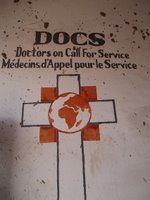 After awhile, you get used to it. You get used to planning your day to be flexible so you can check your email while there's electricity and, hopefully, an internet connection. You get used to having food on the stove, ready to cook for that precious hour when it comes on. You get used to dropping everything when the water runs so you can take a shower, wash dishes, and do laundry. You get used to the constant requests for money, a job, candy, a ride, a scholarship to a school, any school, as long as it's in America. You get used to the bumpy roads covered in lava rocks, and you get used to being covered in the lava's black dust all the time. You get used to taxi drivers asking for your phone number or your hand in marriage when they don't even know your name. You get used to arguing over the price of everything, until you realize that thirty cents to you is the difference between eating dinner and going without for the woman selling you an extra two tomatoes. You get used to seeing half-naked children running along the streets alone, sleeping under tables in the market, and begging for food from strangers. You get used to the unbelievable disparity between the lifestyle of the aid workers (a lifestyle of which
After awhile, you get used to it. You get used to planning your day to be flexible so you can check your email while there's electricity and, hopefully, an internet connection. You get used to having food on the stove, ready to cook for that precious hour when it comes on. You get used to dropping everything when the water runs so you can take a shower, wash dishes, and do laundry. You get used to the constant requests for money, a job, candy, a ride, a scholarship to a school, any school, as long as it's in America. You get used to the bumpy roads covered in lava rocks, and you get used to being covered in the lava's black dust all the time. You get used to taxi drivers asking for your phone number or your hand in marriage when they don't even know your name. You get used to arguing over the price of everything, until you realize that thirty cents to you is the difference between eating dinner and going without for the woman selling you an extra two tomatoes. You get used to seeing half-naked children running along the streets alone, sleeping under tables in the market, and begging for food from strangers. You get used to the unbelievable disparity between the lifestyle of the aid workers (a lifestyle of which 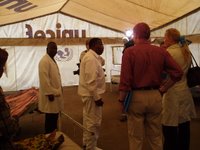 you yourself are a part) and the people they are trying to help. You get used to hearing about plane crashes and earthquakes and foreign army invasions and the misery that will ensue when (not if) the volcano erupts again. You get used to the fact that the place you go when you need a break is ... Rwanda. You get used to the appalling statistics – annual per capita income in the country is $120, infant mortality is 129 in 1000 births, there are only 500 kilometers of paved road in the entire country, 15 soldiers died yesterday. You have to get used to it. Otherwise you wouldn't be able to get out of bed in the morning. But there's a danger in getting used to life in the eastern Congo – if you're not careful, you'll forget why you're here.
you yourself are a part) and the people they are trying to help. You get used to hearing about plane crashes and earthquakes and foreign army invasions and the misery that will ensue when (not if) the volcano erupts again. You get used to the fact that the place you go when you need a break is ... Rwanda. You get used to the appalling statistics – annual per capita income in the country is $120, infant mortality is 129 in 1000 births, there are only 500 kilometers of paved road in the entire country, 15 soldiers died yesterday. You have to get used to it. Otherwise you wouldn't be able to get out of bed in the morning. But there's a danger in getting used to life in the eastern Congo – if you're not careful, you'll forget why you're here.Yesterday I saw things I hope I never get used to. Some bigwigs from UNICEF were at
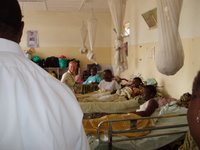 DOCS/Heal Africa for a visit and I asked if I could tag along on their tour. With all the time I've spent there, I haven't actually been through the hospital. We visited the wards and saw all these faces. Words aren't enough to talk about the fear and pain and hope on the faces of the patients there. The women in this ward are waiting for fistula surgery. They have been raped, usually violently and often by gangs, and as a result, have fistulas. And I don't mean to offend anyone's sensibilities, but if you don't know what a fistula is, I'm going to explain it here, because you need to
DOCS/Heal Africa for a visit and I asked if I could tag along on their tour. With all the time I've spent there, I haven't actually been through the hospital. We visited the wards and saw all these faces. Words aren't enough to talk about the fear and pain and hope on the faces of the patients there. The women in this ward are waiting for fistula surgery. They have been raped, usually violently and often by gangs, and as a result, have fistulas. And I don't mean to offend anyone's sensibilities, but if you don't know what a fistula is, I'm going to explain it here, because you need to 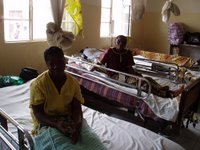 understand what this means. When a woman is the victim of a particularly violent rape, the tissue wall between her vagina and urinary tract or rectum is torn, and the tissue just disappears. Meaning that a constant stream of waste passes out of her body. This can also happen in childbirth, but in the eastern Congo it is almost entirely a result of the rape epidemic that has accompanied the war. Many women who have fistulas are cast out of their families and homes – they don't smell good, and their families shame them. They have to fend for themselves, and usually end up in abject poverty, with a serious health problem that won't go away without surgery.
understand what this means. When a woman is the victim of a particularly violent rape, the tissue wall between her vagina and urinary tract or rectum is torn, and the tissue just disappears. Meaning that a constant stream of waste passes out of her body. This can also happen in childbirth, but in the eastern Congo it is almost entirely a result of the rape epidemic that has accompanied the war. Many women who have fistulas are cast out of their families and homes – they don't smell good, and their families shame them. They have to fend for themselves, and usually end up in abject poverty, with a serious health problem that won't go away without surgery. 
If they make it to DOCS, they have hope. Because surgery can repair a fistula, but you have to wait one month to start the surgery, then two months to see if it worked. Often it takes multiple tries. There are women who have been at DOCS for two years, enduring surgery after surgery in hopes that their bodies will heal.
These are the women of the waiting wards. The room that is a tent is where the women who have just arrived at DOCS recover from their journey and wait for evaluation. The room that is actually a room is where women and girls wait for one of the two surgeons to be able to operate on them.
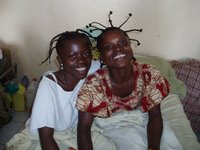
They saw our cameras (UNICEF travels with cameramen and photographers) and wanted their portraits made. And so many people smiled, especially the young girls. How do you smile when this is your life?
I have promised to make prints in Nairobi next week and bring them back. UNICEF promised to send prints along as well. It's strange to think that these may be among the very few pictures of
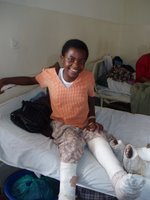 themselves these women and girls will ever own. It's sad to know that they are pictures from something sad, and not from their weddings or the births of their children. But maybe for them, the chance to have decent healthcare and to sleep in a clean, modern hospital and maybe, just maybe, to get their lives back is reason to smile.
themselves these women and girls will ever own. It's sad to know that they are pictures from something sad, and not from their weddings or the births of their children. But maybe for them, the chance to have decent healthcare and to sleep in a clean, modern hospital and maybe, just maybe, to get their lives back is reason to smile.We went to the orthopedic surgery ward after that. Dr. Lusi is the only orthopedic surgeon in the eastern Congo. Most of the children there arrived with club feet and have had surgery to correct their problems. I talked for awhile with these two precious little girls. They had to travel
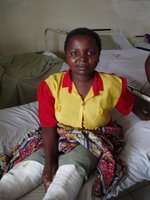 far – one over 400 kilometers, which is two days' journey – to get this surgery, but they were full of hope and laughter and smiles.
far – one over 400 kilometers, which is two days' journey – to get this surgery, but they were full of hope and laughter and smiles.After that we went over to the maternity ward. Almost all of the babies born at DOCS were conceived as a result of rape. These twins, David and Martin, were born one month ago. Their mother is fourteen years old. She was raped by a soldier, had fistula repair surgery, and managed to carry them for seven months before delivery. 30 weeks. If a baby makes it to 30 weeks in the U.S., that baby will almost certainly survive. If a baby only makes it to 30 weeks in the Congo, it will almost certainly die.
David and Martin are perhaps the luckiest babies in eastern Congo, because their mother somehow got to the place with the only incubator in Goma, in a hospital that has a generator to keep the power on. You'll notice that they are not hooked up to feeding tubes or IV drips or heartbeat monitors, as they would be back home. Those are luxuries here. The monitors for these babies are the loving doctors and nurses who keep watch over them all the time; they are fed milk by hand. David and Martin have spent the first month of their life in an incubator next to a desk, where they can be watched all the time and helped to grow. Dr. Lusi, who is eternally full of hope, says that maybe they will be Senators one day.
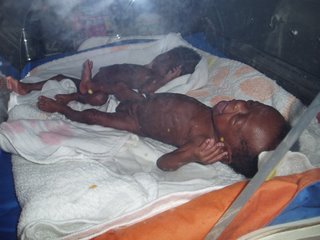 David and Martin are growing. They have full heads of hair, as you can see. Like so many children in the east, they also have faces that are wise beyond their years. I don't know how to explain it; it is like looking into the face of an old man who has seen too much of the pain and tragedy of life, but who hopes and loves nonetheless. How this is possible for two four-week-old babies who can't really see to begin with, I don't know.
David and Martin are growing. They have full heads of hair, as you can see. Like so many children in the east, they also have faces that are wise beyond their years. I don't know how to explain it; it is like looking into the face of an old man who has seen too much of the pain and tragedy of life, but who hopes and loves nonetheless. How this is possible for two four-week-old babies who can't really see to begin with, I don't know.Their mother is having a hard time. I can't imagine what it is like to have twin babies as a result of rape. Or to try to deal with the emotions and physical pain and prospect of a difficult future at the age of 14. But the counselors at DOCS are working with her, showing her love, and trying to help her to love her babies. If this happened somewhere else in the world, those babies could be adopted by parents who could provide a home and an education and good food and warm clothes and love. But here, if she can't learn to love them and learn to provide for them, they will die. There's no one else who can take care of David and Martin.





